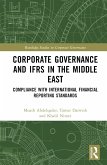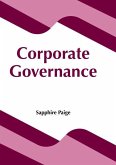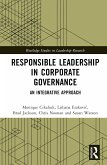Advances in Corporate Governance
Comparative Perspectives
Herausgeber: Anheier, Helmut K; Baums, Theodor
Advances in Corporate Governance
Comparative Perspectives
Herausgeber: Anheier, Helmut K; Baums, Theodor
- Gebundenes Buch
- Merkliste
- Auf die Merkliste
- Bewerten Bewerten
- Teilen
- Produkt teilen
- Produkterinnerung
- Produkterinnerung
This volume examines the performance of corporate governance regimes since the Global Financial Crisis in 2008 and analyses whethe regulatory changes and corporate governance codes have made a difference.
Andere Kunden interessierten sich auch für
![Corporate Governance in India Corporate Governance in India]() Corporate Governance in India56,99 €
Corporate Governance in India56,99 €![The Intelligent Nation The Intelligent Nation]() John BeckfordThe Intelligent Nation183,99 €
John BeckfordThe Intelligent Nation183,99 €![Partnership and Transformation Partnership and Transformation]() Leda StottPartnership and Transformation171,99 €
Leda StottPartnership and Transformation171,99 €![Corporate Governance and IFRS in the Middle East Corporate Governance and IFRS in the Middle East]() Muath AbdelqaderCorporate Governance and IFRS in the Middle East171,99 €
Muath AbdelqaderCorporate Governance and IFRS in the Middle East171,99 €![Corporate Governance Corporate Governance]() Corporate Governance139,99 €
Corporate Governance139,99 €![Corporate Governance and Management Corporate Governance and Management]() Corporate Governance and Management139,99 €
Corporate Governance and Management139,99 €![Responsible Leadership in Corporate Governance Responsible Leadership in Corporate Governance]() Monique CikaliukResponsible Leadership in Corporate Governance171,99 €
Monique CikaliukResponsible Leadership in Corporate Governance171,99 €-
-
-
This volume examines the performance of corporate governance regimes since the Global Financial Crisis in 2008 and analyses whethe regulatory changes and corporate governance codes have made a difference.
Produktdetails
- Produktdetails
- Verlag: Oxford University Press, USA
- Seitenzahl: 336
- Erscheinungstermin: 22. Dezember 2020
- Englisch
- Abmessung: 236mm x 155mm x 28mm
- Gewicht: 658g
- ISBN-13: 9780198866367
- ISBN-10: 0198866364
- Artikelnr.: 60141424
- Verlag: Oxford University Press, USA
- Seitenzahl: 336
- Erscheinungstermin: 22. Dezember 2020
- Englisch
- Abmessung: 236mm x 155mm x 28mm
- Gewicht: 658g
- ISBN-13: 9780198866367
- ISBN-10: 0198866364
- Artikelnr.: 60141424
Helmut K. Anheier is past President of the Hertie School of Governance in Berlin and Professor of Sociology. He is also a faculty member of the Luskin School of Public Affairs at UCLA. His research centres on indicator systems, social innovation, culture, civil society and philanthropy, and organisational studies. He held a Chair of Sociology at Heidelberg University and served as Academic Director of the Centre for Social Investment and Innovation. He was a senior researcher at the Johns Hopkins University's Institute for Policy Studies, and Centennial Professor at the London School of Economics and Political Science. Anheier is author of over 500 publications and received various international awards. Theodor Baums was the director of the Institute for Banking Law at the Johann Wolfgang Goethe-University in Frankfurt/Main and was one of the founders of the Institute for Law and Finance where he serves as a member of the management board. Prof. Baums has given numerous lectureships in Europe and in the U.S. Areas of current scholarly interest are corporations and capital markets. He has published more than 120 books and articles on corporations and civil and antitrust law. In 2005 he was awarded with the Euro Corporate Governance Quality Award by the Federal Minister of Justice and in 2006 with the Grand Cross 1st Class of the Order of Merit of the Federal Republic of Germany. The Hertie School in Berlin prepares exceptional students for leadership positions in government, business, and civil society. The school offers master's, doctoral and executive education programmes distinguished by interdisciplinary and practice-oriented teaching, as well as outstanding research. Its extensive international network positions it as an ambassador of good governance, characterised by public debate and engagement. The school was founded in 2003 by the Hertie Foundation, which remains its major funder. The Hertie School is accredited by the state and the German Science Council.
* 1: Helmut K. Anheier and Christoph M. Abels: Corporate Governance in
Comparative Perspective
* 2: Helmut K. Anheier and Christoph M. Abels: Corporate Governance:
What are the Issues?
* 3: Theodor Baums: Listed Companies: Regulatory Tools and Current
Reform Issues
* 4: Iris H-Y Chiu: Corporate Governance of Financial Corporations
* 5: Jonas Gabrielsson, Morten Huse, and Carl Åberg: Corporate
Governance in Small and Medium Enterprises
* 6: Hanna Surmatz: Corporate Governance Regulation for Public Benefit
Foundations in Europe
* 7: Gemma Donnelly-Cox, Michael Meyer, and Filip Wijkström: Nonprofit
Governance
* 8: Johanna Mair, Miriam Wolf, and Alexandra Ioan: Governance in
Social Enterprises
* 9: Cecilia Cannon and Thomas Biersteker: The Governance of
International Organizations: Structural Components, Internal
Mechanisms, and Contemporary Challenges
* 10: Ulf Pappenfuß: Public Corporate Governance
* 11: Daniela Stockmann: Media or Corporations? Social Media Governance
between Public and Commercial Rationales
* 12: Julia Redenius-Hövermann: Behavioural Economics, Neuroeconomics,
and Corporate Law
* 13: Helmut K. Anheier and Christoph M. Abels: Advances in Corporate
Governance: Conclusion and Implications
Comparative Perspective
* 2: Helmut K. Anheier and Christoph M. Abels: Corporate Governance:
What are the Issues?
* 3: Theodor Baums: Listed Companies: Regulatory Tools and Current
Reform Issues
* 4: Iris H-Y Chiu: Corporate Governance of Financial Corporations
* 5: Jonas Gabrielsson, Morten Huse, and Carl Åberg: Corporate
Governance in Small and Medium Enterprises
* 6: Hanna Surmatz: Corporate Governance Regulation for Public Benefit
Foundations in Europe
* 7: Gemma Donnelly-Cox, Michael Meyer, and Filip Wijkström: Nonprofit
Governance
* 8: Johanna Mair, Miriam Wolf, and Alexandra Ioan: Governance in
Social Enterprises
* 9: Cecilia Cannon and Thomas Biersteker: The Governance of
International Organizations: Structural Components, Internal
Mechanisms, and Contemporary Challenges
* 10: Ulf Pappenfuß: Public Corporate Governance
* 11: Daniela Stockmann: Media or Corporations? Social Media Governance
between Public and Commercial Rationales
* 12: Julia Redenius-Hövermann: Behavioural Economics, Neuroeconomics,
and Corporate Law
* 13: Helmut K. Anheier and Christoph M. Abels: Advances in Corporate
Governance: Conclusion and Implications
* 1: Helmut K. Anheier and Christoph M. Abels: Corporate Governance in
Comparative Perspective
* 2: Helmut K. Anheier and Christoph M. Abels: Corporate Governance:
What are the Issues?
* 3: Theodor Baums: Listed Companies: Regulatory Tools and Current
Reform Issues
* 4: Iris H-Y Chiu: Corporate Governance of Financial Corporations
* 5: Jonas Gabrielsson, Morten Huse, and Carl Åberg: Corporate
Governance in Small and Medium Enterprises
* 6: Hanna Surmatz: Corporate Governance Regulation for Public Benefit
Foundations in Europe
* 7: Gemma Donnelly-Cox, Michael Meyer, and Filip Wijkström: Nonprofit
Governance
* 8: Johanna Mair, Miriam Wolf, and Alexandra Ioan: Governance in
Social Enterprises
* 9: Cecilia Cannon and Thomas Biersteker: The Governance of
International Organizations: Structural Components, Internal
Mechanisms, and Contemporary Challenges
* 10: Ulf Pappenfuß: Public Corporate Governance
* 11: Daniela Stockmann: Media or Corporations? Social Media Governance
between Public and Commercial Rationales
* 12: Julia Redenius-Hövermann: Behavioural Economics, Neuroeconomics,
and Corporate Law
* 13: Helmut K. Anheier and Christoph M. Abels: Advances in Corporate
Governance: Conclusion and Implications
Comparative Perspective
* 2: Helmut K. Anheier and Christoph M. Abels: Corporate Governance:
What are the Issues?
* 3: Theodor Baums: Listed Companies: Regulatory Tools and Current
Reform Issues
* 4: Iris H-Y Chiu: Corporate Governance of Financial Corporations
* 5: Jonas Gabrielsson, Morten Huse, and Carl Åberg: Corporate
Governance in Small and Medium Enterprises
* 6: Hanna Surmatz: Corporate Governance Regulation for Public Benefit
Foundations in Europe
* 7: Gemma Donnelly-Cox, Michael Meyer, and Filip Wijkström: Nonprofit
Governance
* 8: Johanna Mair, Miriam Wolf, and Alexandra Ioan: Governance in
Social Enterprises
* 9: Cecilia Cannon and Thomas Biersteker: The Governance of
International Organizations: Structural Components, Internal
Mechanisms, and Contemporary Challenges
* 10: Ulf Pappenfuß: Public Corporate Governance
* 11: Daniela Stockmann: Media or Corporations? Social Media Governance
between Public and Commercial Rationales
* 12: Julia Redenius-Hövermann: Behavioural Economics, Neuroeconomics,
and Corporate Law
* 13: Helmut K. Anheier and Christoph M. Abels: Advances in Corporate
Governance: Conclusion and Implications








